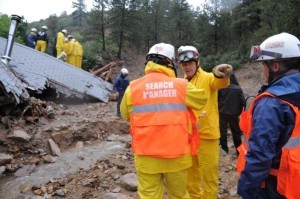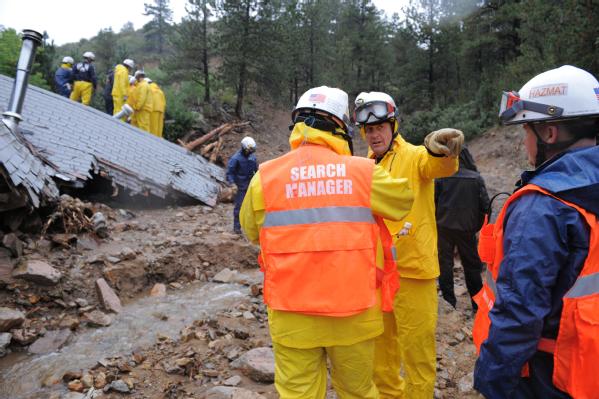Vice President Joe Biden is promising residents that aid for areas devastated by massive flooding in Colorado won’t stop even if the federal government shuts down.
“I promise you, I promise you, there will be help,” Biden said after flying by helicopter Monday over the Big Thompson River, and fields and reservoirs swollen with muddy brown water.
Biden stood with Colorado Gov. John Hickenlooper and members of the state’s congressional delegation to tell Coloradans not to fear that budget problems in Washington could stall aid.
“It’s probably going to scare the living devil out of you,” Biden said about debt ceiling negotiations in Congress. Biden insisted the “dysfunction” in Washington won’t affect emergency spending.
“They will not shut down even if the Congress doesn’t fund the federal government,” Biden said, pointing to federal emergency relief workers behind him.

The death toll from Colorado’s flooding rose to eight Monday, when a 79-year-old woman whose house was swept away by the Big Thompson River was found dead on the riverbank.
The number of people unaccounted for dwindled to six. One other person was still missing and presumed dead – a 60-year-old woman from Larimer County. A man was taken off the list Monday after walking into the sheriff’s office.
The floods caused damage across nearly 2,000 square miles. Nearly 2,000 homes were damaged or destroyed along with more than 200 miles of state highways and 50 state bridges.
The floods are also blamed for spills of about 27,000 gallons of oil in northern Colorado oilfields, including two mishaps found over the weekend, the Colorado Oil and Gas Conservation Commission said.
The commission said it’s tracking eight notable leaks, 10 other locations with some evidence of leaks, and 33 places where oilfield equipment appears damaged but no evidence of spills has been spotted. About 1,300 oil and gas wells remain shut down.
The National Weather Service has issued a flood warning for the Kersey area in northeastern Colorado, saying water from recent rain will continue to move down the South Platte River on Tuesday.
The Federal Emergency Management Agency said it had approved $19.6 million in individual assistance, most of it to help people to repair homes or find temporarily rentals. More than 15,600 people have applied for FEMA relief.
The U.S. Department of Transportation has pledged an initial $35 million for roads, and Colorado has allocated $100 million.
Colorado’s congressional delegation is lobbying to raise the Federal Highway Administration’s $100 million funding cap for emergency relief to $500 million – an amount approved after Hurricane Sandy struck Atlantic states last year.
Colorado officials have awarded four contracts for emergency bridge and highway repairs. Officials hope to complete temporary fixes to at least some of the heavily damaged roads by Dec. 1.
Was this article valuable?
Here are more articles you may enjoy.


 Elon Musk Alone Can’t Explain Tesla’s Owner Exodus
Elon Musk Alone Can’t Explain Tesla’s Owner Exodus  One out of 10 Cars Sold in Europe Is Now Made by a Chinese Brand
One out of 10 Cars Sold in Europe Is Now Made by a Chinese Brand  Why 2026 Is The Tipping Point for The Evolving Role of AI in Law and Claims
Why 2026 Is The Tipping Point for The Evolving Role of AI in Law and Claims  Founder of Auto Parts Maker Charged With Fraud That Wiped Out Billions
Founder of Auto Parts Maker Charged With Fraud That Wiped Out Billions 